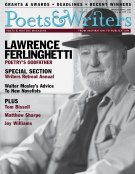It is perfectly acceptable to stretch, poke, prod, or even inflate the definition of "literary magazine" to suit one's fancy. And it's precisely this freedom of form that makes most lit mags fun to read and, one can imagine, edit. Document, a biannual publication of the nonprofit Center for Documentary Studies (CDS) at Duke University, is, on the one hand, a fifty-page newsletter—albeit beautifully produced—about the fine work being done at, and funded by, the center. On the other hand, it's a collection of creative essays, poems, and photographs, which sounds a lot like a literary magazine. (Of course, writers can't submit work or buy the publication on the newsstand, but that's true of many journals.) The CDS was founded in 1990 to foster the work of writers and other artists who "capture and convey contemporary memory, life, and culture." Readers may remember the center as the first home of Doubletake, the quarterly journal founded by Robert Coles in 1995, which folded in 2003. Incidentally, last year Coles merged Doubletake with Points of Entry: Cross-Currents in Storytelling, a magazine that had focused on "narrative journalism" before it, too, folded, in 2005. The result is Doubletake: Points of Entry, whose mission is—deep breath—to "present compelling, insightful stories in words and images that open windows onto the human experience and act as catalysts for community-service efforts, to present many points of entry into human experience, encouraging a kind of serious, patient consideration of the perspectives, visions, and concerns of others." But getting back to Document, the last issue included an essay about plainclothes cops in Dneprodzerzhinsk, a city in central Ukraine, by Larry Frolick (who, with photographer Donald Weber, won the CDS's 2006 Lange-Taylor Prize); a poem by Natasha Trethewey, who delivered a lecture at CDS last March; and photographs of the Black Panthers in the 1960s by Stephen Shames. No matter what one chooses to call it, Document is a compelling read.
The editor of a sixty-year-old literary magazine who just three months ago launched a Web site is either a Luddite or Rip Van Winkle, right? Wrong. "I love the techno!" insists Claudia Keelan, editor of Interim. "It was easy to decide to make a Web site, but it was just a matter of funding." Keelan, who has been the editor of the annual journal at the University of Las Vegas, Nevada, since 2000, says she had been publishing Interim without a budget until the university and its International Institute of Modern Letters recently set aside a "nice chunk of change." While the magazine does not yet have national distribution, subscriptions are available on the new Web site. And get this: Keelan says prices are negotiable! "We hope that folks will pay the actual amount, but we like to remain flexible to accommodate everyone," she says. "I'm surrounded by graduate students and I know how limited money is, so we work to help the cash-challenged."
The University of Salzburg in Austria was founded three hundred and eighty-five years ago—fourteen years before Harvard University, which is generally considered the oldest "institution of higher learning" in the United States. Poetry Salzburg Review is considerably younger than that—the first biannual issue was published in 2001—but there is still something rather distinguished about editor Wolfgang Görtschacher's journal. Perhaps it has something to do with its truly international list of contributors. Number 10, published last fall, includes the work of forty-seven poets from Austria, Canada, Denmark, India, Ireland, Italy, South Africa, and other points around the globe.
Kevin Larimer is the senior editor of Poets & Writers Magazine.








